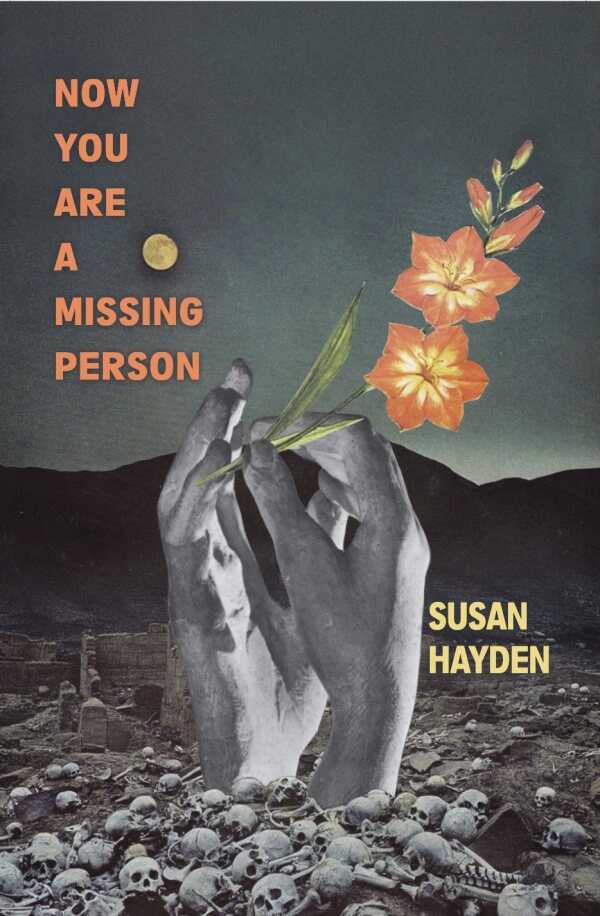Now You Are a Missing Person
A Memoir in Poems, Stories and Fragments
Now You Are a Missing Person is an intricate, poetic memoir that touches upon personal and universal concerns of womanhood.
Spanning girlhood and widowhood, Susan Hayden’s poetic memoir Now You Are a Missing Person contemplates love and loss.
Split into eight sections mapping Hayden’s maturation in an earnest melding of free verse and prose poetry, this collection begins with Hayden’s childhood amid the celebrity culture of 1970s Los Angeles. As its entries extend beyond adolescence, they become heartfelt, recounting Hayden’s reservations about marriage and motherhood and encounters with death. Moments of joy and possibility also play in, made possible through musical communion.
From its outset, the collection evokes attraction to those on the edges of society. “Outlaws” focuses on men in mugshots: “they were scruffy and real, and I hated anything that was shiny and anyone who was polished.” This rebellious dynamism carries throughout in Hayden’s intimate, heartfelt identifications with those deemed “lowlifes.” From adolescence to young adulthood, she idealizes and elevates outsiders: leading pornography actress Marilyn Chambers, older actors past their prime, and the faithless young man at the deli who would turn the senior portrait of his girlfriend around to the wall during their moments of passion.
Compassion arises when it comes to girlhood desires and memories that are carried into adulthood. Capturing adolescence’s restlessness, agitation, and frustration, Hayden muses, “I longed to cross over into something where I too was undressed and it was unpredictable, something the complete opposite of the cage that confined me.” With sensitivity, brevity, and artfulness, she unwinds the psychology behind her disordered binge eating, drawing upon youth’s unseen emptiness: “I ate to fill a blank, one I felt in the form of a gaping hole I couldn’t name.” The collection tempers its self-proclaimed “New Romantic” energy with self-deprecation, acknowledging patterns of cyclical, destructive behavior; Hayden writes, with blunt candor, about the man she, lovesick, will marry:
And there I was at twenty seven, with another young son of another compelling, half-available man with an anger issue, another actor who’d wanted to be a household name, another one raised by wolves with no rules, no guidelines, too much charisma and an imagined license to spew.
With similar unflinching honesty, the book exposes the rampant exploitation of youthful talent beneath the glamour of stardom. Hayden’s friend Kimmi is offered thousands of dollars to lie about her age and model for Playboy magazine. Later, the book deals with the deaths of Kimmi, Hayden’s father, and her husband too, shifting its attention from the situated, musical tactility of Los Angeles toward internalizing and distilling moments of grief via abstractions. Daunted by the prospect of raising their son without a father after her husband’s death, Hayden likens the challenge to “a ‘Quest’ story / with its circuitous route, / its point and its shoot, / its natural disasters.”
In its language, the later portions of the collection seize upon stillness and starkness, mirroring how grief freezes people in time. With subtle circularity, moments of respite and healing result from persistent preoccupations. Multiple poems and stories confess a continued magnetization of alternative approaches to life, as when Hayden consults a psychic to speak with her deceased husband. Elsewhere, having connected before with her strict father through music, Hayden upholds the healing potential of song and the written word; an entry details organizing a Library Girl show, a communal theater space for artists.
Setting grief to music and verse, Now You Are a Missing Person is an intricate, poetic memoir that touches upon the personal and universal concerns of womanhood.
Reviewed by
Isabella Zhou
Disclosure: This article is not an endorsement, but a review. The publisher of this book provided free copies of the book and paid a small fee to have their book reviewed by a professional reviewer. Foreword Reviews and Clarion Reviews make no guarantee that the publisher will receive a positive review. Foreword Magazine, Inc. is disclosing this in accordance with the Federal Trade Commission’s 16 CFR, Part 255.

